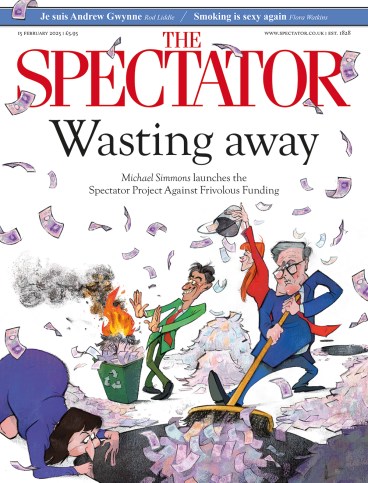
Britons used to be able to rely on their parliament to safeguard liberty and their wallets. Those who were sent to the House of Commons came not as petitioners for a larger government and greater state expenditure but as guardians of individual freedom and defenders of private property. It was self-evident to them that those who spent their own money would always spend it more wisely than those who took others’ money and spent it to please whom they may.
During those times MPs, including even ministers, regarded restraint on executive power and tight control on public spending as unquestioned virtues, and the nation prospered. The United Kingdom was seldom better governed, more respected or faster-growing than when the great Liberal William Gladstone was – successively – chancellor and prime minister. His economic doctrine was simple: ‘All excess in the public expenditure beyond the legitimate wants of the country is not only a pecuniary waste but a great political and a great moral evil.’
A waste because bureaucracies are money- and power-aggrandising organisms which allocate resources more inefficiently the larger they grow. And a political and moral evil because the more individuals and institutions rely on the state for their income, the less initiative, enterprise and effort they display and the more they compete to outbid others in an auction of inadequacy in which their claim upon others is predicated on the injustices they can advertise. Industry is penalised, thrift punished, growth squashed. The incentives are all to divide society on the basis of whose grievances are most deserving of the salve of subsidy.
Today, Gladstone is less than a ghost. His spirit is practically extinguished. As Michael Simmons and Theodore Agnew record on pages 12-14, in unsparing detail, government is spending at a level and in a fashion which is, in every way, unsustainable. The state takes 45 per cent of the nation’s income and borrows like a gambling addict to spend more. Our level of debt requires us to pay almost twice in much on interest as we do on defence.
In those areas of government which are considered essential to national welfare – most notably the NHS – expenditure is set to rise ahead of both inflation and our currently anaemic growth rate, but with no evidence of greater productivity. However, it is not just inefficiency in the management of basic public services that burns through our national income. As we report, there are vanishingly few effective safeguards against fraud, especially in welfare spending. The approach of departments towards public procurement is at best naive, at worst criminally negligent. And billions of pounds of taxpayers’ money is directed towards projects which Jonathan Swift would be incapable of satirising and Brass Eye scriptwriters would have rejected as too implausible.
Bureaucracies are money- and power-aggrandising organisms which become more inefficient the larger they grow
The British state, to take just a few examples, pays thousands of pounds to an Irish Republican rap group whose name celebrates punishment beatings and whose lyrics celebrate drug-taking, violence and the break-up of the UK. The government also lavishes cash on diversity, equity and inclusion training for builders and has purchased Porsches for Albanian prisons, e-bikes for welfare claimants and Teslas for lighthouse keepers.
The relentless pressure to expand state spending is not restricted to the UK. Every advanced democracy has its lobby groups proclaiming that historic injustices can only be addressed with generous grant funding; its rent-seeking corporations exploiting poor procurement practices; its bureaucratic establishments intent on expanding their remit. But in the US there is a determined effort to control the appetite of the ever-expanding administrative state. Donald Trump has established the Department of Government Efficiency, given the acronym Doge in a nod to Elon Musk’s favourite crypto-currency. Under Musk’s leadership, Doge has set about highlighting government expenditure which, subject to full scrutiny, becomes impossible to defend to the public.
President Trump may have faults of character, Musk’s social media posts may not be the most restrained of interventions in public debate, and the knowing references to online culture might seem to cast Doge in the light of an adolescent troll of serious statecraft. But whatever criticisms might be directed at the pair and their project, there is no denying that the energetic unveiling of waste and uncontrolled profligacy in public spending is an undiluted good for the US taxpayer. If democracy dies in darkness, then so too does taxpayers’ money vanish if no one shines a light on where it goes.
That is why we are making available our own online tool (www.spectator.co.uk/spaff) to help readers to identify where their money goes. We want to deploy the wisdom of crowds to highlight folly in the public finances. We will campaign for greater transparency, efficiency and economy in how your money is spent. This country will only enjoy growth, preserve liberty and enable human flourishing if we bind the leviathan tighter. And unleash our inner Gladstone.
How do we stop Britain’s bureaucratic bloat? Michael Simmons and Lord Agnew joined the latest Edition podcast to discuss:







Comments